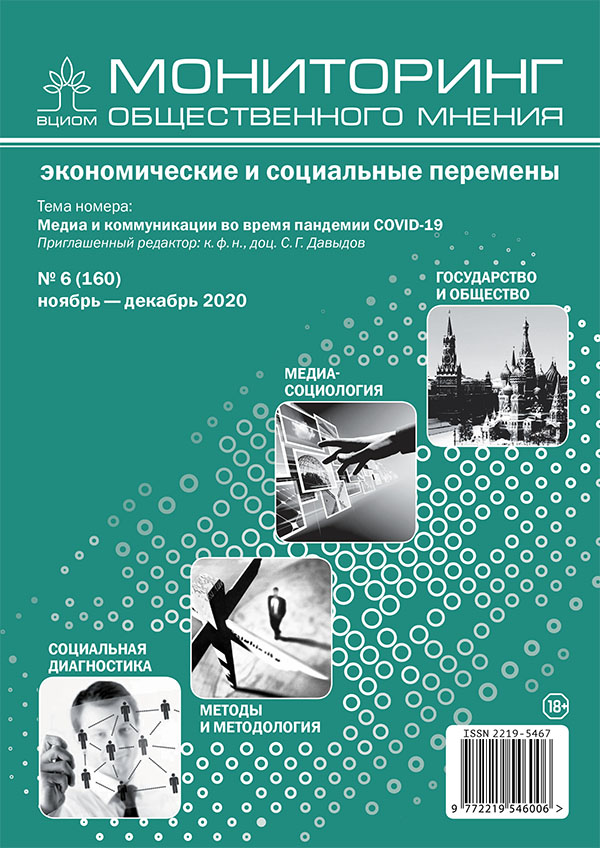Цифровизация социальных контактов среди студенческой молодежи в России во время пандемии коронавируса
DOI:
https://doi.org/10.14515/monitoring.2020.6.1749Ключевые слова:
цифровизация социальных контактов, интенсивность социальных контактов, формы социальных контактов, социальные последствия эпидемии COVID-19, социально-психологическое самочувствие, депрессия, Международный опрос о благополучии студентов в период коронавируса (МОБС)Аннотация
Внедрение цифровых технологий приводит к изменениям во многих областях социальной жизни, постепенному переходу к «цифровому обществу». Карантинные меры по предотвращению распространения COVID-19 стали стимулирующим фактором развития цифровых социальных контактов. В первую очередь эти изменения затрагивают молодежь. Данные сравнительного исследования «Международный опрос о благополучии студентов в период коронавируса» (ISSC-МОБС) показывают, что во время режима самоизоляции социальные контакты остались важнейшим элементом образа жизни студенческой молодежи благодаря использованию цифровых форм взаимодействия. Внедрение цифровых технологий в социальную жизнь повысило интенсивность межпоколенных, личных и общих социальных контактов. В период карантина цифровые коммуникации позволили существенно снизить риски социальной изоляции, сохранить социальные связи, поддержать стабильность системы социальных отношений.
Цифровые контакты не становятся заменой личному общению с семьей, партнером и близким кругом людей, не ведут к меньшей интенсивности таких контактов, а дополняют имеющиеся возможности. Форма социальных контактов и субъекты контактов значимо влияют на социально-психологическое состояние людей во время карантинных мер. Интенсивное общение с близкими людьми в любой, в том числе цифровой форме, положительным образом сказывается на социально-психологическом состоянии, снижает вероятность проявления симптомов депрессии и одиночества, стимулирует положительные эмоции. Однако длительное время, проведенное в социальных сетях, безличные формы контактов без установления стабильной эмоциональной связи, напротив, ведут к увеличению симптомов депрессии, негативно влияют на социально-психологическое самочувствие студенческой молодежи.
Влияние цифровизации двойственно: оно ведет к расширению возможностей для социальных контактов с близкими людьми в кризисных ситуациях или в условиях территориальной удаленности, но в случае интенсивного погружения в мир цифровых социальных сетей оказывает негативный социально-психологический эффект.
Загрузки
Опубликован
Как цитировать
Выпуск
Раздел
Лицензия
Copyright (c) 2020 Мониторинг общественного мнения: экономические и социальные перемены

Это произведение доступно по лицензии Creative Commons «Attribution-NonCommercial-ShareAlike» («Атрибуция — Некоммерческое использование — На тех же условиях») 4.0 Всемирная.






